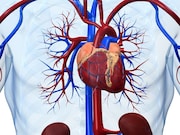Revascularization patients with T2DM and CKD more likely to experience a major adverse event
WEDNESDAY, Feb. 27, 2019 (HealthDay News) — The presence of comorbid chronic kidney disease (CKD) negatively impacts myocardial revascularization outcomes in patients with type 2 diabetes mellitus (T2DM), according to a study published in the Feb. 5 issue of the Journal of the American College of Cardiology.
Michael E. Farkouh, M.D., from the University of Toronto, and colleagues pooled data from three randomized trials of patients with CKD and T2DM undergoing revascularization (with coronary artery bypass graft [CABG] or percutaneous coronary intervention [PCI]) or being treated medically for stable ischemic heart disease. In total, 1,058 (21.4 percent) of the 4,953 patients had CKD.
The researchers found that CKD patients were more likely to be older, be female, and have a history of heart failure. During a median 4.5 years of follow-up, CKD participants were more likely to experience a major adverse cardiovascular or cerebrovascular event (MACCE; adjusted hazard ratio [HR], 1.48). MACCE was predicted by both mild (estimated glomerular filtration rate [eGFR] 45 to 60 mL/min/1.73 m²) and moderate to severe (eGFR <45 mL/min/1.73 m²) CKD (adjusted HRs, 1.25 and 2.26, respectively). CABG plus optimal medical therapy (OMT) was associated with lower MACCE rates versus PCI plus OMT (adjusted HR, 0.69) among patients without CKD. For patients with CKD, there was only a statistically significant difference between CABG and PCI in subsequent revascularization rates (HR, 0.25), but not in MACCE rates.
“In patients with stable ischemic heart disease and T2DM and normal renal function, CABG is associated with lower rates of major adverse cardiovascular events compared with PCI, but the difference in outcomes is lost in those with CKD,” the authors write.
Gilead Sciences provided funding for the study.
Editorial (subscription or payment may be required)
Copyright © 2019 HealthDay. All rights reserved.








